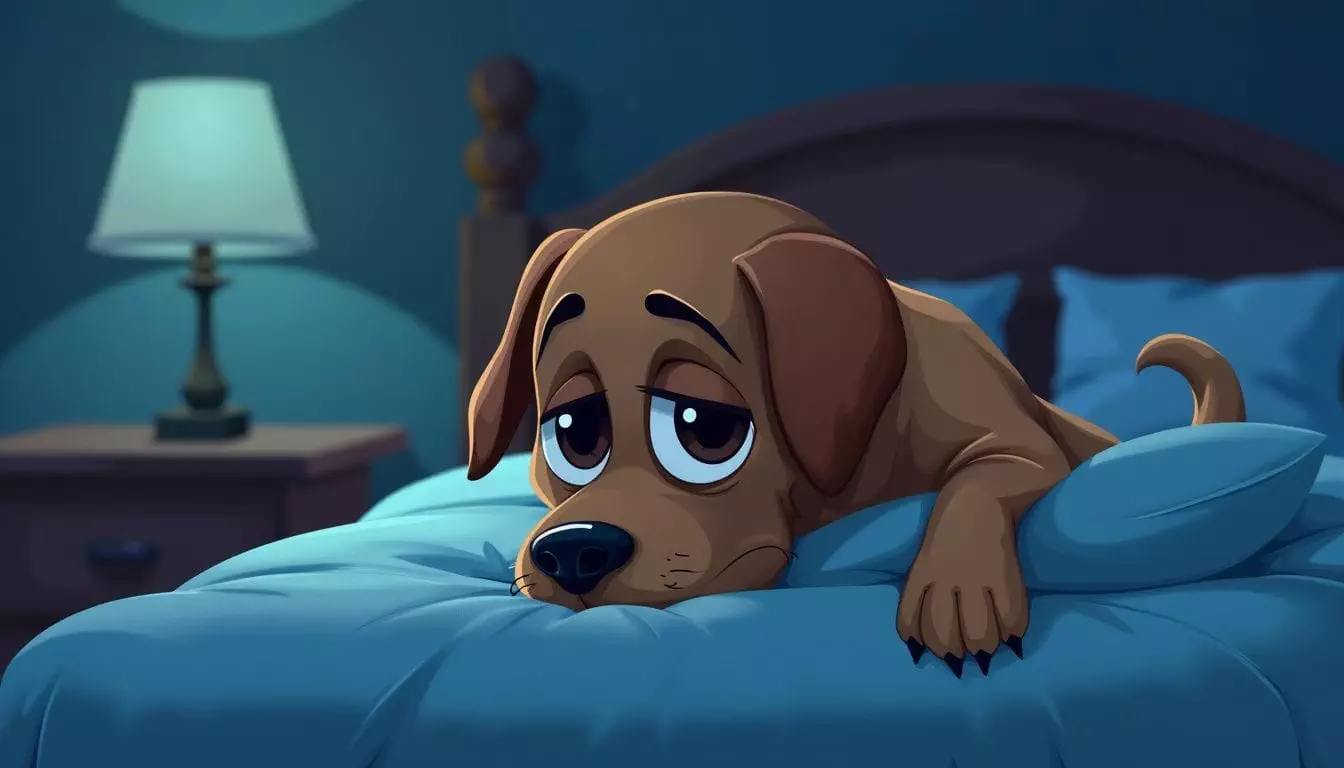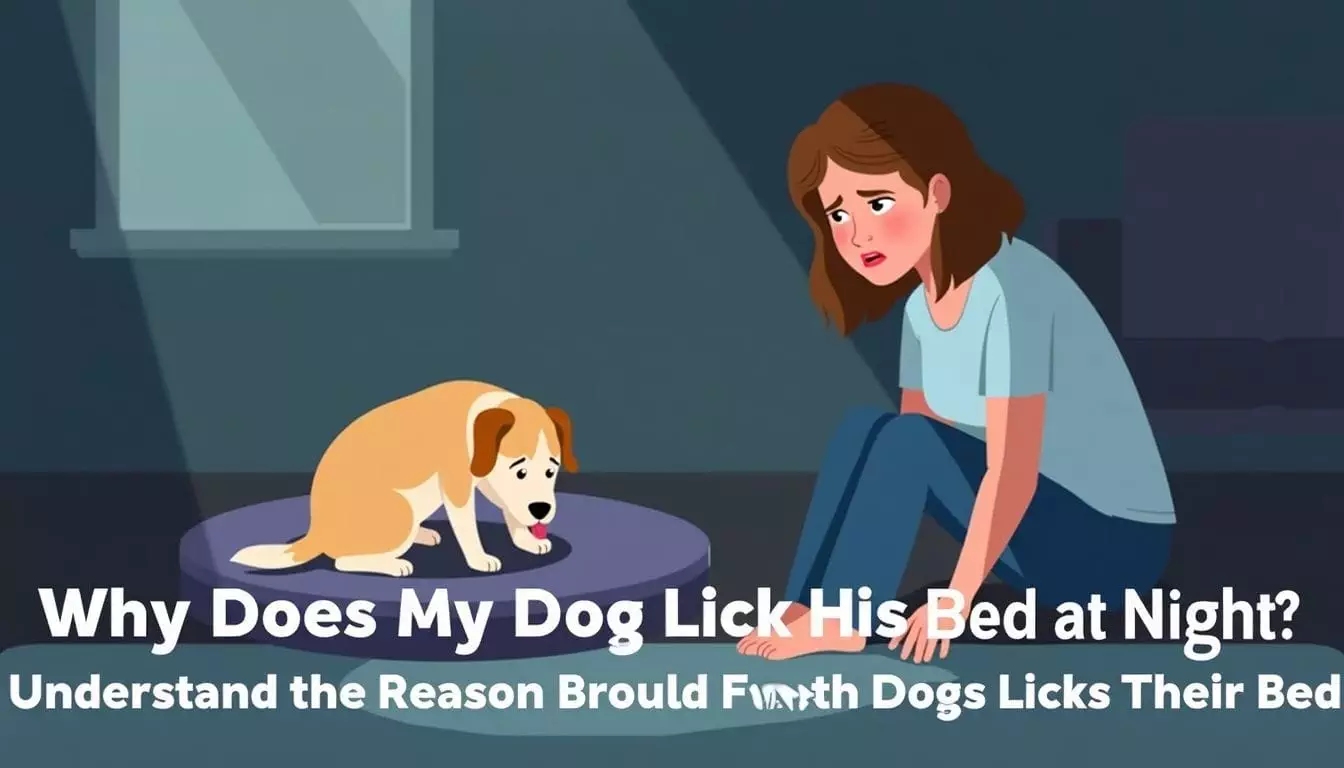Dogs licking their beds at night often puzzles pet owners. Why does my dog lick his bed at night? This common behavior stems from various reasons, including comfort-seeking and stress relief.
Dogs may lick their beds to recreate the soothing feelings they experienced as puppies when licking their mothers. This action releases endorphins, helping dogs relax and feel secure in their sleeping area. 1
Veterinarians and animal behaviorists have studied this phenomenon extensively. Our team of certified dog trainers and pet care experts has observed that bed-licking can indicate underlying health issues or emotional needs. 2 Understanding the root cause is crucial for addressing this behavior effectively. Let’s explore the reasons behind your dog’s nighttime bed-licking habit. 3
Key Takeaways
- Dogs lick their beds for comfort, to relieve stress, or due to boredom.
- Bed-licking can be a sign of health issues like dental problems or skin allergies.
- Giving dogs more exercise and mental stimulation may reduce bed-licking.
- Sudden carpet licking could mean stomach troubles or other health concerns.
- Regular vet check-ups help find and fix the reasons behind excessive licking.
Common Reasons Dogs Lick Their Beds at Night

Dogs often lick their beds at night for various reasons. This behavior can stem from comfort-seeking, stress relief, or boredom.
Comfort and Security
Dogs often lick their beds for comfort and security. This behavior mimics self-grooming, which calms them down. Familiar scents on the bed make dogs feel safe and relaxed. A vet explains:.
Licking releases endorphins in dogs, creating a soothing effect similar to when they groom themselves or others.
Some pups suck on blankets too. This habit links back to nursing as puppies. Luxury dog beds can boost feelings of safety for our furry friends. Licking helps dogs cope with being alone or feeling anxious. 1
Stress or Anxiety Relief
Dogs often lick their beds to cope with stress or anxiety. This behavior releases endorphins, which help them feel calmer. 3 Many pups turn to bed-licking as a self-soothing method during tough times.
Signs of anxiety in dogs include more barking and trouble relaxing. 1
Vets and trainers see this a lot in their practice. A dog might lick its bed after a big change at home or during a thunderstorm. It’s their way of dealing with fear or worry. Some dogs develop this habit due to past trauma or lack of socialization.
Health issues can also cause anxiety-related licking. Next, we’ll explore how boredom can lead to excessive bed-licking.
Boredom or Lack of Stimulation
Stress and anxiety aren’t the only causes of bed-licking. Boredom can also trigger this behavior. A dog without enough mental or physical activity may start licking their bed. This often happens when dogs lack engaging toys or fun things to do. 4
Owners might notice their pup licking the bed more at night. This could mean the dog needs more daytime exercise or play. Giving dogs puzzles, chew toys, or extra walks can help stop boredom licking.
These activities keep their minds busy and bodies tired, leading to better sleep habits. 2
Health-Related Causes of Bed Licking
Dogs may lick their beds due to health issues. These can range from minor to serious problems.
Dental Issues
Dental problems can make dogs lick their beds. Tooth decay, gum disease, and mouth infections cause pain. This discomfort leads to more licking and grooming. Dogs may lick their beds to soothe sore gums or aching teeth. 5
Regular dental care prevents these issues. Brush your dog’s teeth daily. Get vet check-ups twice a year. Dental chews and toys also help keep teeth clean. Catching problems early stops excessive licking. 5 Next, we’ll explore how skin irritations affect a dog’s licking habits.
Skin Irritations or Allergies
Dogs may lick their beds due to skin issues or allergies. Itchy skin from environmental triggers or food sensitivities can prompt this behavior. Fleas, mites, and other parasites also cause discomfort, leading to excessive licking.
Redness, hair loss, and oozing skin often signal these problems. 5
Allergies need a multi-step approach for treatment. Vets can pinpoint the cause through tests and exams. They may suggest diet changes, medications, or special shampoos to ease symptoms.
Owners should watch for signs like restless sleep or whining during grooming. Quick action helps prevent further skin damage and keeps dogs comfy in their beds. 7
Underlying Medical Conditions
Beyond skin issues, other health problems can cause bed licking. Pain from arthritis or injuries may lead dogs to lick for relief. 8 Gastrointestinal troubles like acid reflux or nausea can trigger licking too.
Some dogs with brain tumors or neurological disorders also show this behavior.
Hormonal imbalances and thyroid problems are other possible culprits. 9 If a dog suddenly starts licking excessively, it’s smart to see a vet. They can check for hidden medical causes and suggest the right treatment.
Early care often leads to better outcomes for dogs with health issues.
Similar Behaviors in Dogs: Why is My Dog Licking the Carpet All of a Sudden?
Dogs may lick carpets due to health issues. Acid reflux or liver problems can cause this behavior. 11 Vets often suggest Pepcid AC or Pepto Bismol to help with nausea. Some dogs lick to make themselves throw up.
A bland diet of boiled chicken and rice can ease stomach troubles. If licking continues, a vet visit is needed. Serious conditions must be ruled out. Pet owners can use positive training to stop unwanted licking.
Giving dogs proper toys can redirect this habit. 10
Next, we’ll explore the conclusion of our discussion on why dogs lick their beds at night.
Conclusion
Bed licking often originates from comfort-seeking or stress relief. Pet owners can address this habit by increasing playtime and mental stimulation. Regular veterinary check-ups help eliminate health issues as potential causes of the behavior.
Identifying the root cause allows for effective solutions customized to each dog’s needs. With patience and care, owners can guide their canine companions towards healthier nighttime routines. Understanding dog breeds and their natural instincts can also provide valuable insights into the root cause of nighttime disturbances. For example, some breeds are known for their nocturnal behavior or tendency to bark at night. By recognizing these traits, owners can better tailor their approach to addressing their dog’s nighttime issues. Additionally, working with a professional dog trainer or behaviorist can offer further support and guidance in finding the right solutions for each individual dog. Consistency in implementing training techniques and establishing a soothing bedtime routine can also make a significant difference in addressing nighttime challenges. Understanding factors like environmental triggers, lighting, and even answering questions such as can dogs see in the dark can shed light on their nocturnal behavior. Creating a calm, secure environment aligned with their natural instincts ensures that both dogs and their owners can enjoy more peaceful nights.
For more insights into related behaviors, check out our article on why is my dog licking the carpet all of a sudden.
FAQs
1. Why does my dog lick his bed at night?
Dogs lick their beds for many reasons. It could be a way to self-soothe, deal with stress, or show they’re comfy. Some pups do it out of habit or boredom. If it’s new behavior, check for health issues or anxiety. Understanding why dogs lick their beds can help owners determine if their pet is simply seeking comfort or if there is an underlying issue that needs addressing. Observing other changes in behavior, such as increased anxiety or restlessness, can provide further clues. Always consult with a veterinarian if you notice persistent licking, as they can help identify potential health concerns.
2. Is it normal for dogs to lick their beds?
Yes, licking is natural for canines. They use it to explore, clean, and calm down. But if your pooch licks obsessively, it might signal a problem. Watch for changes in how often or how long they lick.
3. Could bed-licking mean my dog is sick?
Sometimes. Excessive licking might point to allergies, skin issues, or tummy troubles. If you notice other odd signs – like less energy or appetite changes – chat with your vet. They can rule out health concerns.
4. How can I stop my dog from licking the bed too much?
First, figure out why they’re doing it. Give them more play and mental tasks to beat boredom. For anxiety, try calming aids or comfy spots. If it’s a habit, gently redirect them. For tough cases, ask a dog pro for tips.
5. Does the bed’s material or smell cause licking?
It might! Dogs have super noses and taste buds. They may like the texture or scent of the bed. Some fabrics hold onto smells more. Try washing the bed or switching materials to see if it helps.
6. Can older dogs develop a bed-licking habit?
Yes, senior pups can pick up new quirks. Changes in routine or health might lead to more licking. Older dogs may also lick to cope with aches or confusion. Keep an eye on new behaviors and talk to your vet about age-related changes.
References
- ^ https://www.petsradar.com/features/why-does-my-dog-lick-the-bed (2024-04-19)
- ^ https://www.dogforum.com/threads/obsessive-licking-in-bed-waking-up-in-middle-of-the-night.35665/ (2013-04-18)
- ^ https://nestpets.com/blogs/nest-pets-blog/why-do-dogs-lick-their-bed?srsltid=AfmBOopWp9yoPCCS5r1g8mvz0yu4K8xzD2UJPD0Ave1WOx073GrZ7tnl (2024-03-27)
- ^ https://nestpets.com/blogs/nest-pets-blog/why-do-dogs-lick-their-bed?srsltid=AfmBOooLygUxWK53YTnaLFRSD9aAtGGCyR9cfvyYXYT7_Kub1Ethazhm (2024-03-27)
- ^ https://www.petmd.com/dog/general-health/excessive-licking-chewing-and-grooming-dogs (2021-09-27)
- ^ https://www.justanswer.com/dog-health/81pkd-does-dog-lick-everything-the-bed-sheets-rug.html (2013-10-10)
- ^ https://nestpets.com/blogs/nest-pets-blog/why-do-dogs-lick-their-bed (2024-03-27)
- ^ https://www.petsbest.com/blog/12-reasons-dogs-lick-excessively (2022-11-18)
- ^ https://www.akc.org/expert-advice/advice/why-dogs-lick-furniture/
- ^ https://www.justanswer.com/dog-health/g6tzv-dog-woke-profusely-licking-carpet.html
- ^ https://www.justanswer.com/dog-health/65o07-year-old-dog-licking-carpet-sounds.html (2012-01-26)

